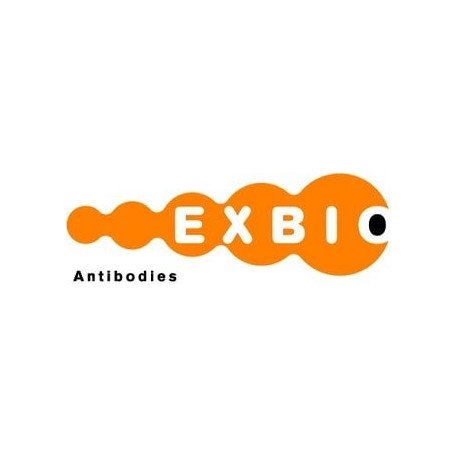Cart 0 Product Products (empty)
No products
To be determined Shipping
0,00 € Total
Prices are tax excluded
Product successfully added to your shopping cart
Quantity
Total
There are 0 items in your cart. There is 1 item in your cart.
Total products (tax excl.)
Total shipping (tax excl.) To be determined
Total (tax excl.)
Data sheet of Mouse Monoclonal to CD138 / Syndecan 1
| Brand | Exbio |
| Product type | Primary antibodies |
| Reactivity | Human |
| Clonality | Monoclonal |
More info about Mouse Monoclonal to CD138 / Syndecan 1
| Brand: | Exbio |
| Product no.: | 10-520-C025 |
| Product type: | Primary antibodies |
| Host species: | Mouse |
| Product name: | Mouse Monoclonal to CD138 / Syndecan 1 |
| Antigen: | CD138 |
| Clonality: | Monoclonal |
| Clone: | B-A38 |
| Isotype: | IgG1 |
| Immunogen: | U266 human peripheral blood myeloma cell line |
| Format: | azide free |
| Specificity: | The antibody B-A38 recognizes CD138 (syndecan 1), a 65-70 kDa heparan sulfate proteoglycan expressed mainly in the epidermis and plasma cells, but also in growth factor-stimulated lymphocytes. _x000D_ |
| Categories: | CD and Related Antigens (Human) |
| Concentration: | 1 mg/ml |
| Storage buffer: | Azide free phosphate buffered saline (PBS), approx. pH 7.4; 0.2 μm filter sterilized. |
| Storage / stability: | Store at 2-8°C. Do not freeze. Do not use after expiration date stamped on vial label. |
| Background: | CD138 (syndecan 1) is a transmembrane proteoglycan that can bind a variety of cytokines and modulate their activity, as well as the activity of extracellular matrix components and influence many developmental processes. CD138 is expressed mainly in differentiating keratinocytes and is transiently upregulated in all layers of the epidermis upon tissue injury. It is also highly expressed on plasma cells and can be detected even on fibroblasts, vascular smooth muscle cells and endothelial cells. Up-regulation and down-regulation of CD138 on the cell surface often correlates with the gain of cancerous characteristics. Serum levels of the shedded soluble sCD138 are used as a prognostic factor of cancerogenesis. _x000D_ |
| Purity: | > 95% (by SDS-PAGE) |
| Purification: | Purified by protein-A affinity chromatography |
| Product specific references: | *Kuchen S, Robbins R, Sims GP, Sheng C, Phillips TM, Lipsky PE, Ettinger R: Essential role of IL-21 in B cell activation, expansion, and plasma cell_x000D_ generation during CD4+ T cell-B cell collaboration. J Immunol. 2007 Nov 1;179(9):5886-96._x000D_ _x000D_ _x000D_ , *Cheriyath V, Glaser KB, Waring JF, Baz R, Hussein MA, Borden EC: G1P3, an IFN-induced survival factor, antagonizes TRAIL-induced apoptosis in human myeloma cells. J Clin Invest. 2007 Oct;117(10):3107-17._x000D_ _x000D_ _x000D_ , *Yang Y, MacLeod V, Dai Y, Khotskaya-Sample Y, Shriver Z, Venkataraman G, Sasisekharan R, Naggi A, Torri G, Casu B, Vlodavsky I, Suva LJ, Epstein J, Yaccoby S, Shaughnessy JD Jr, Barlogie B, Sanderson RD: The syndecan-1 heparan sulfate proteoglycan is a viable target for myeloma therapy. Blood. 2007 Sep 15;110(6):2041-8._x000D_ _x000D_ |
| General references: | *Jilani I, Wei C, Bekele BN, Zhang ZJ, Keating M, Wierda W, Ferrajoli A, Estrov Z, Kantarjian H, O'Brien SM, Giles FJ, Albitar M: Soluble syndecan-1 (sCD138) as a prognostic factor independent of mutation status in patients with chronic lymphocytic leukemia. Int J Lab Hematol. 2008 Jan 7., *Ojeh N, Hiilesvuo K, Wärri A, Salmivirta M, Henttinen T, Määttä A: Ectopic expression of syndecan-1 in basal epidermis affects keratinocyte proliferation and wound re-epithelialization. J Invest Dermatol. 2008 Jan;128(1):26-34., *Muto T, Miyoshi K, Munesue S, Nakada H, Okayama M, Matsuo T, Noma T: Differential expression of syndecan isoforms during mouse incisor amelogenesis. J Med Invest. 2007 Aug;54(3-4):331-9._x000D_ , *Manakil JF, Seymour GJ, Bartold PM: Effect of cytokine and antigen stimulation on peripheral blood lymphocyte syndecan-1 expression. Oral Microbiol Immunol. 2007 Aug;22(4):272-6._x000D_ , *Choi DS, Kim JH, Ryu HS, Kim HC, Han JH, Lee JS, Min CK: Syndecan-1, a key regulator of cell viability in endometrial cancer. Int J Cancer. 2007 Aug 15;121(4):741-50._x000D_ , *Hayashida K, Johnston DR, Goldberger O, Park PW: Syndecan-1 expression in epithelial cells is induced by transforming growth factor beta through a PKA-dependent pathway. J Biol Chem. 2006 Aug 25;281(34):24365-74. |
| Related products: | - Mouse Monoclonal to CD140b / PDGF-RB - Mouse Monoclonal to CD14 / LPS-receptor - Mouse Monoclonal to CD140a / PDGF-RA |
| Shipping condition: | Room temperature |


